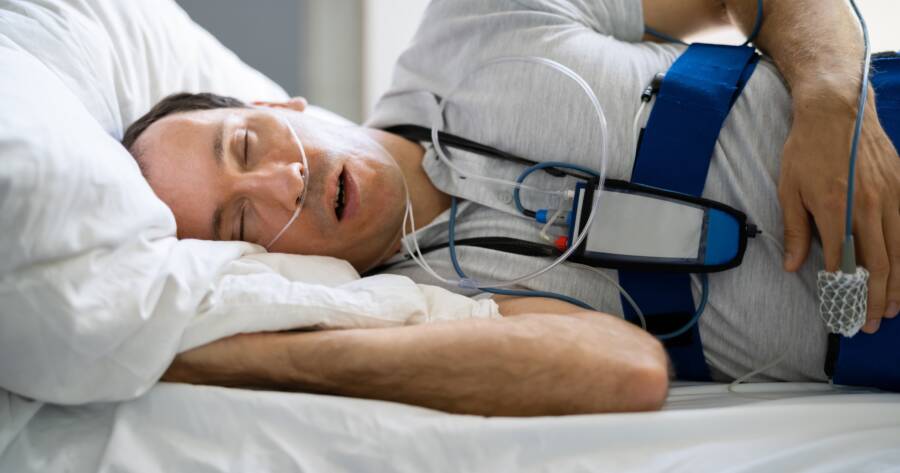Sleep apnea can turn restful nights into a struggle for air, leaving you exhausted no matter how long you sleep. Interrupted breathing not only affects energy levels but also increases the risk of serious health issues like heart disease and high blood pressure. The good news is that small lifestyle changes and effective treatment strategies can lead to better rest and overall well-being. Managing sleep apnea starts with understanding its impact and taking action to support healthier sleep.
Understanding Sleep Apnea
Sleep apnea occurs when the muscles in the throat relax too much, blocking the airway and stopping breathing for short periods. These interruptions, called apneas, can happen many times throughout the night, disrupting sleep. The most common types are obstructive sleep apnea (OSA) and central sleep apnea (CSA). OSA is more common and occurs when the airway becomes physically blocked, while CSA happens when the brain fails to send the right signals to the muscles that control breathing.
Sleep apnea can cause loud snoring, daytime fatigue, and difficulty concentrating. If left untreated, it can also increase the risk of serious conditions like high blood pressure, heart disease, and stroke. Recognizing these symptoms is the first step in getting the help you need.
Maintain a Healthy Weight
Carrying extra weight, especially around the neck, can put pressure on the airway, making sleep apnea worse. Losing even a small amount of weight can reduce symptoms significantly. A healthy diet combined with regular exercise can help shed extra pounds and improve your overall health. Focus on eating whole foods like fruits, vegetables, lean proteins, and whole grains. Avoid processed foods high in sugar and unhealthy fats, which can lead to weight gain.
Exercise also plays a vital role in managing sleep apnea. Regular physical activity not only helps with weight loss but can also improve lung function and strengthen muscles in the airway. Simple activities like walking, swimming, or yoga can make a big difference.
Adjust Your Sleep Position
The position you sleep in can impact sleep apnea. Sleeping on your back can cause the tongue and soft tissues in the throat to collapse, blocking the airway. Side sleeping, however, can keep the airway open and reduce apnea events. Using a body pillow or specially designed sleep apnea pillows can help keep you in a side-sleeping position throughout the night.
If you have difficulty adjusting to side sleeping, try elevating the head of your bed. This can prevent the airway from collapsing while you sleep. Even small adjustments like raising the head by four to six inches can make a big difference in reducing symptoms.
Use a CPAP Machine
For many people with moderate to severe sleep apnea, a continuous positive airway pressure (CPAP) machine is the most effective treatment. This device delivers a steady flow of air through a mask, keeping the airway open and preventing apneas. While it may take some time to get used to wearing the mask, CPAP machines can drastically improve sleep quality and reduce health risks.
It’s important to clean your CPAP machine and mask regularly to prevent bacteria buildup. Your doctor or a sleep specialist can help you adjust the settings on your CPAP machine to ensure maximum comfort and effectiveness.
Avoid Alcohol and Sedatives
Alcohol and sedatives can relax the muscles in the throat, making sleep apnea worse. They also suppress your breathing during sleep, which can lead to more apneas throughout the night. Limiting or avoiding alcohol, especially in the evening, can reduce sleep disruptions. If you take sedatives or sleep medications, speak with your doctor about alternatives that won’t worsen your sleep apnea.
Instead of relying on sleep aids, focus on creating a relaxing bedtime routine. Turn off electronics at least an hour before bed, and try reading or meditating to calm your mind. Going to bed at the same time each night can also help your body adjust to a healthier sleep schedule.
Seek Medical Advice and Treatment
If you suspect you have sleep apnea, it’s essential to consult with a healthcare provider or sleep specialist. They can perform tests, such as a sleep study, to diagnose the condition and recommend the best treatment plan. Untreated sleep apnea can lead to serious health problems, so getting professional help is key.
In addition to CPAP therapy, your doctor may suggest other treatments, such as dental devices that reposition the jaw or surgery to remove excess tissue from the throat. Every person’s case is different, and a customized treatment plan can help improve your sleep and overall health.
Take Control of Your Sleep Apnea
Living with sleep apnea can feel challenging, but by making small lifestyle changes, you can take control of your condition. Maintaining a healthy weight, adjusting your sleep position, and using treatments like CPAP machines can greatly improve your sleep and reduce health risks. If you’re struggling with sleep apnea, don’t hesitate to seek medical advice. Improving your sleep is key to improving your overall health and well-being.




